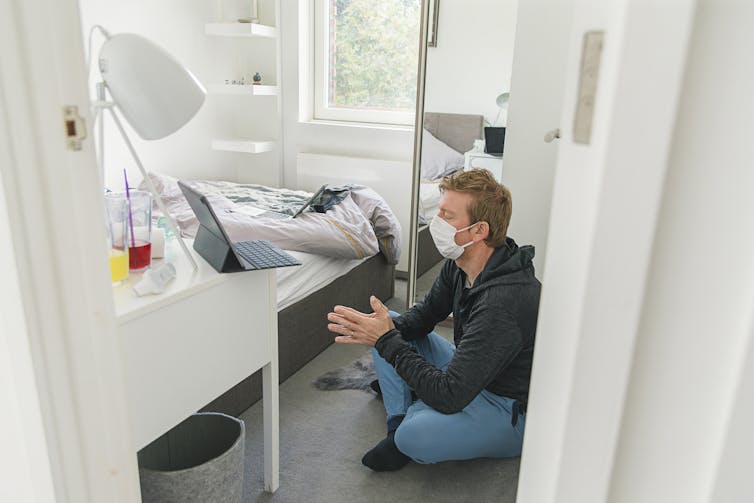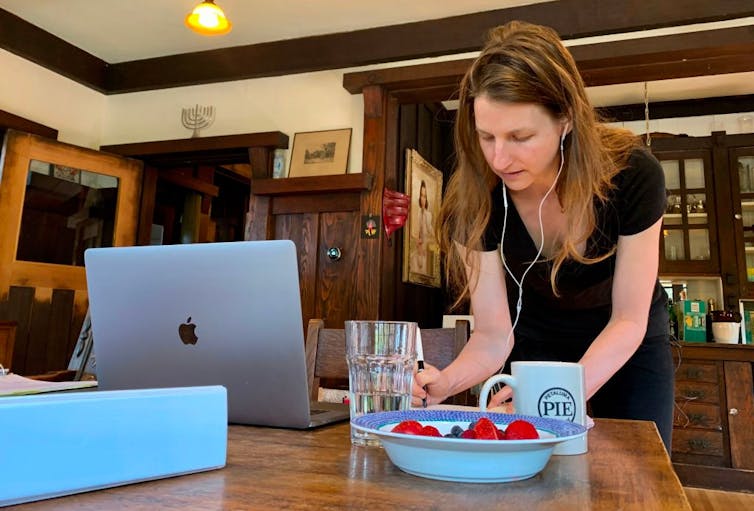In most of the world, much of us are still at home to prevent the spread of the coronavirus. But getting stuck in our home can lead to boredom.
Boredom is a sign that we are not meaningfully engaged with the world. It tells us to stop doing what we are doing and to do it better, or to do something else.
But, as a social psychologist who studies boredom , I know that people don’t always make the best decisions when they are bored. So if you’re stuck at home, obediently practicing your social distancing, how can you avoid boredom?
About boredom
We can feel bored even with jobs and activities that seem meaningful. For example, researchers have found that anesthesiologists and air traffic controllers get bored at work.
What this research reveals is that just because something is objectively significant doesn’t mean we feel that way all the time . And even meaningful work can be boring if the person doing it finds it too difficult or too easy . Once that happens, people can have a hard time staying focused .
Reducing boredom requires people to solve the problems that produced it, without having enough activities that are meaningful and with optimal challenge.
However, sometimes people turn to activities that make them feel better in the moment, but do not provide long-term meaning or challenge. For example, studies have shown that people are willing to give themselves ‘electric shocks’ when they are bored.
Other behaviors associated with increased susceptibility to boredom include increased alcohol intake and marijuana use . Boredom is also linked to unhealthy snacking and online pornography .
While these may feel good in the moment, they only provide temporary relief. To prevent boredom and keep it away, we need to find solutions at home that provide lasting meaning and challenge.
1. Remember why you are doing this
People generally prefer doing something to doing nothing . Since staying home is the most effective way to prevent further transmission of the coronavirus, it is important to isolate yourself socially. However, you may not always feel that way.
Like all emotions, boredom is about what you are thinking right now . That means staying home will only feel relevant when we actively think about the greater good it does. For example, in studies, when students were asked to reflect on why their school work mattered to them personally, researchers found that their interest in learning increased .
In other words, reframing our activity changes how we feel about it.

Creating simple reminders, such as a note on the refrigerator or a morning meditation, can help us keep the big picture in view – staying home is a sacrifice we are actively making for the good of others.
2. Find a rhythm
Routines structure our days and provide a sense of coherence that reinforces our meaning in life . People’s lives feel more meaningful in the moments when they participate in daily routines.
We lose those routines when we stop going to the office or when we get fired. Even retirees or stay-at-home parents are affected by city, restaurant and school closures. This loss of routine can lead to feelings of boredom .
By creating new routines, people can regain a sense of meaning that takes them away from boredom.
3. Go with the flow
Figuring out what to do when faced with long unstructured days from work or school can be difficult . A recent study of quarantined people in Italy found that boredom was the second most common problem , after loss of freedom.
One thing that makes these situations difficult is that it can be difficult to find activities that are challenging enough to keep you busy without being too demanding. This situation can leave people bored and frustrated .
It helps to keep in mind that what is deemed too challenging or not challenging enough will change throughout the day . Don’t force yourself to keep doing it if you need a break.
4. Try something new
Boredom drives many of us toward the novel . Accept that urge, judiciously. If you have the energy, try a new recipe, experiment with home repairs, learn a new dance on TikTok.
Doing new things not only alleviates boredom, it also helps you acquire new skills and knowledge that can alleviate boredom in the long run. For example, we feel a surge of interest when we read an interesting novel or go through complex experiences, but only if we have the ability to understand them .
Evidence shows that embracing new experiences can help us lead not only happy or meaningful lives, but also psychologically richer ones .
5. Make room for guilty pleasures
It’s okay to ‘binge’ on TV, if that’s all you can handle right now.
Sometimes we paint ourselves in a box where our most significant hobbies are also exhausting or mentally straining . For example, delving into a classic Russian novel can be meaningful, but it isn’t necessarily easy.
Similarly, well-meaning suggestions on how to cope at home, such as hosting a virtual wine and design night, can be simply too exhausting to be enjoyable at a time when many of us are already struggling.
Give yourself permission to enjoy your guilty pleasures. If necessary, reframe those moments as a much-needed mental ‘refresh’, nurturing and recharging them for a later date.
6. Connect with others
Finding meaningful and easy alternatives – small options that don’t require a lot of effort but that we find deeply rewarding – can be challenging.
Fortunately, we all have a good option: connect with others , either virtually or for those who are lucky enough not to be quarantined alone, in person.

Looking at old photos or reminiscing about the past with a friend are simple and meaningful actions that most of us can take even when we are not feeling well. You don’t need a reason to call a friend; our best socialization is the one that occurs casually , in the unstructured time between scheduled activities.
Make space for that virtually too – next time you pour a glass of wine or water the plants, call a friend while you do it. Make dinner together. We don’t have to get bored, when we’re all in this together.
Boredom itself is neither bad nor good, only our decisions about how to counter it make it that way.
This story originally appeared on The Conversation.
Check out more stories about UF research on COVID-19.

